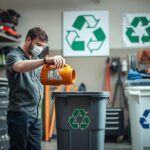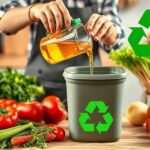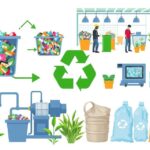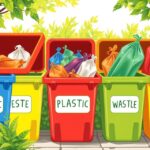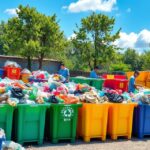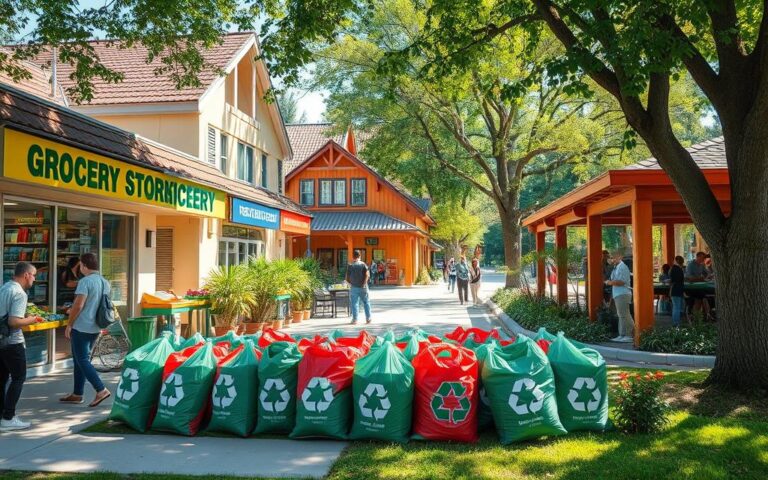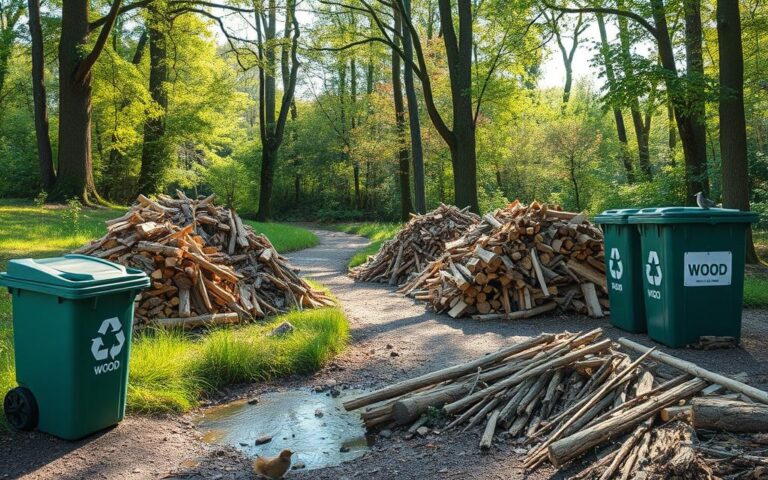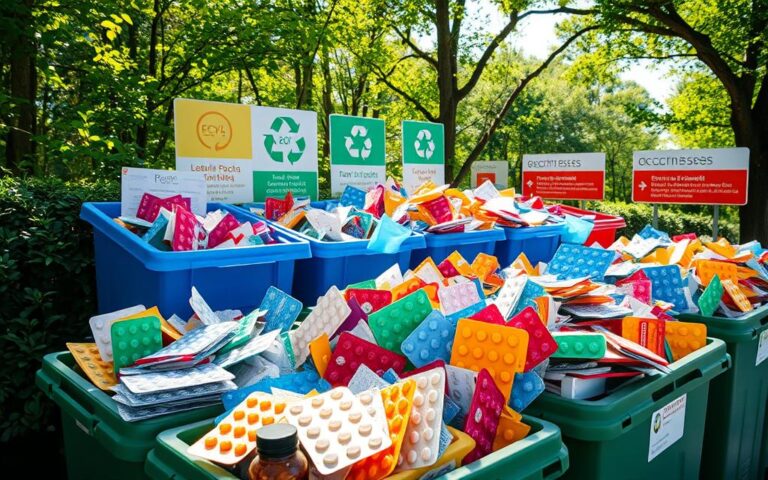Do You Recycle Plastic Bags? Eco-Friendly Guide
Plastic waste is a big worry today, especially with recycling plastic bags. These bags are everywhere in the sea, causing harm. Even though many people use them, barely 1% are recycled. This shows we need better recycling habits.
Thrown away without care, plastic bags can linger for 1,000 years. They hurt our planet. But, recycling them has great benefits. For example, recycling a ton of these bags saves 11 barrels of oil. We’ll share how to recycle them right and why it matters.
Understanding Plastic Bags and Their Types
Plastic bags are everywhere in our daily lives. Yet, many people don’t know about the different types, what they’re made of, and how they can harm our environment. It’s important to know the differences to help recycle better and reduce damage to Earth.
The Composition of Plastic Bags
Plastic bags are mainly made from specific types of polymers. These are given identification numbers. The most common ones are high-density polyethylene (HDPE), which is #2 plastic, and low-density polyethylene (LDPE), known as #4 plastic. How they’re made affects if they can be recycled.
It’s sad but true, many plastic bags don’t have clear recycling labels. This makes recycling harder. Knowing which plastic bags can be recycled is key. If we get this wrong, it can mess up recycling efforts. For info on recyclable bags, check out this guide.
The Environmental Impact of Plastic Bags
The impact of plastic bags on the environment is huge. Billions of bags are used every year, adding to a big waste problem. Although plastics make up 40% of global production, only 9% of all the plastic made has been recycled. This shows we need better recycling plans.
Plastic bags aren’t usually recyclable with regular waste. They cause a lot of litter, harming wildlife. Tiny pieces of plastic from bags get into animals and can even affect humans. This shows why we need to think carefully about using plastic bags.
The Importance of Recycling Plastic Bags
Recycling plastic bags is essential for a sustainable environment. Each year, 1 to 5 trillion plastic bags are used globally. About 100 billion of these are used in the United States. These bags last only about 12 minutes but greatly harm the environment. We can reduce this harm by recycling.
Why You Should Recycle Plastic Bags
There are many reasons to recycle plastic bags. They include reducing pollution and saving natural resources. It also cuts down the need for new plastics. Businesses, like shops, can save money and help the planet by recycling.
- Prevents waste and reduces landfill usage
- Helps create new jobs in composite lumber and playground equipment industries
- Provides clean scrap film for manufacturing, addressing recycling challenges
- Supports state laws aimed at reducing single-use plastic bags
Challenges in Plastic Bag Recycling
Recycling plastic bags faces several issues. In the US, only 12% of plastic bags get recycled. This shows we need better recycling systems. Trash bags made from compostable plastics also add complications.
| Challenge | Impact |
|---|---|
| Low Recycling Rate | Less than 10% recycled, contributing to landfill overflow |
| Contamination by Compostable Plastics | Interferes with recycling efforts, generating methane if not composted |
| Process Inefficiencies | Recycled bags often produce low-quality materials, limiting further uses |
| Insufficient Plastic Bag Collection Points | Most bags cannot be recycled with curbside collection, hindering participation |
Do You Recycle Plastic Bags? How To Effectively Recycle
Recycling plastic bags isn’t as simple as it looks. It requires certain steps to do it right. Knowing how to prepare bags for recycling helps make the process more effective. The main goal is to learn the proper way to clean bags and find an appropriate place for disposal.
Preparation for Recycling Plastic Bags
Getting plastic bags ready for recycling is key. They need to be clean and free from things like leftover food and sticky substances. Keeping a special bin at home for collecting these bags makes it easier. Make sure they’re clean before recycling to avoid contaminating the recycling process.
Where to Recycle Plastic Bags
Finding the right spot to recycle plastic bags is essential. Many supermarkets have bins for recycling bags made of #2 or #4 plastics, known as polyethylene. These bins are usually found near the store’s entrance. This makes it easy to drop bags off for recycling. Some other places also take them for recycling:
| Location | Accepted Items |
|---|---|
| Safeway and Lucky Stores | Reusable shopping bags and plastic items |
| Andronico’s, Berkeley | Number 2 plastic bags, including personal and neighbours’ bags |
| El Cerrito Recycling and Environmental Resource Center | Hard-to-recycle items like block styrofoam |
| Albany Waste Management | All hard plastics except plastic cutlery |
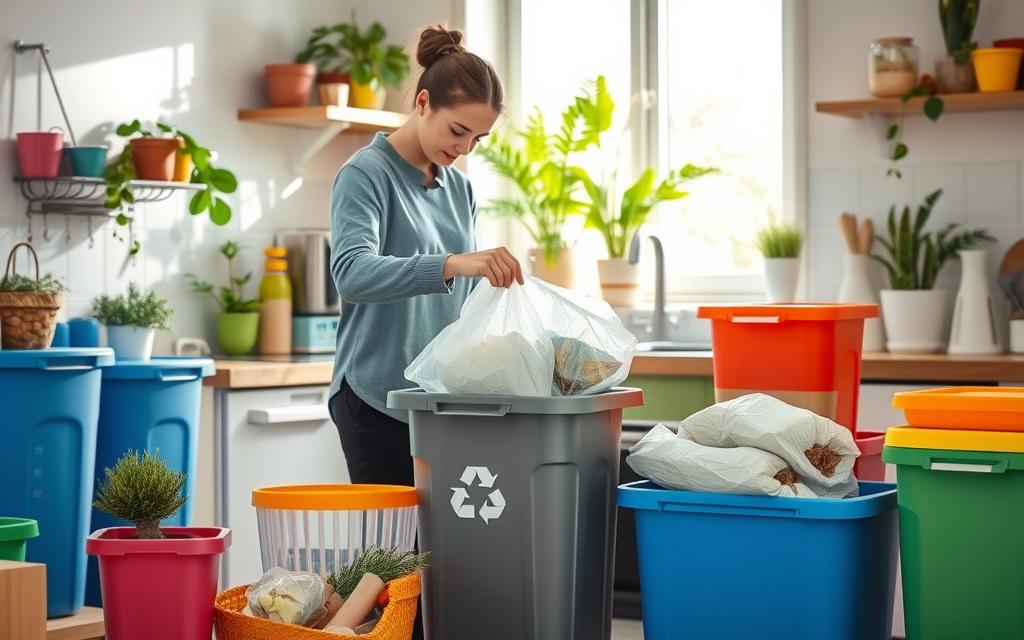
Alternatives to Plastic Bags
More people are realising how bad plastic bags are for the environment. They’re looking for greener choices to avoid single-use plastic bags. This change is part of a larger effort to cut down waste and help our planet.
Eco-Friendly Bag Options
Many people are now choosing reusable bags made from materials that are better for the environment. Some of the top choices are:
- Canvas Bags: These strong bags, made from natural fibres, can be used many times instead of plastic bags.
- Jute Bags: Jute bags decompose naturally. They are fashionable and durable.
- Recycled Plastics: There are reusable bags made from recycled plastics. They turn waste into something useful.
- Silicone Bags: Companies like Stasher make reusable silicone bags. These are great for keeping food and cut down on disposable bags.
- Cotton Drawstring Bags: Eco-Bags makes these out of natural cotton. They encourage reusing bags to reduce plastic rubbish.
Using these alternatives instead of plastic bags helps the environment. Unlike plastic bags that are thrown away after 12 minutes, these options last much longer.
Reducing Plastic Bag Usage
To use fewer plastic bags, it’s not just about picking reusable ones. It’s about committing to greener habits and making better choices. Here’s how to do it:
- Always bring reusable bags when you shop to avoid needing plastic ones.
- Reuse any plastic bags at home for things like bin liners or storage.
- Join in local schemes to recycle plastic bags. Stores like Target and Wal-Mart have bins for this.
- Choose to shop at stores that use sustainable packing.
Customers have a big part to play in using less plastic bags. In the U.S. alone, people use about 100 billion plastic bags a year. Working together, we can cut this down and make a real difference.
| Type of Bag | Material | Lifetime Uses | Environmental Impact |
|---|---|---|---|
| Canvas Bag | Natural Fibres | 100+ uses | Biodegradable |
| Jute Bag | Biodegradable Jute | 50+ uses | Eco-Friendly |
| Recycled Plastic Bag | Recycled Plastics | 50+ uses | Reduces plastic waste |
| Silicone Bag | Silicone | 1000+ uses | Reusable and durable |
| Cotton Bag | Natural Cotton | 100+ uses | Biodegradable |
Conclusion
Recycling plastic bags is essential to lessen environmental harm. Plastic can take up to 1,000 years to break down. Thus, knowing the benefits of recycling is vital. This is especially true since half of all plastic is used just once before being thrown away. In the UK, households toss 1.85 billion plastic items weekly. This fact shows we must boost environmental awareness and take steps to reduce waste.
There are many alternatives to reduce plastic use and increase sustainability. Encouraging the reuse of bags and choosing recyclable options helps. Both individuals and companies can cut their plastic use this way. Good recycling habits, like cleaning bags, finding recycling spots, and following local rules, promote sustainability and responsibility towards the environment.
By adopting these actions, we all help towards a sustainable future. Recycling plastic bags helps save natural resources, wildlife, and ecosystems from plastic harm. Raising awareness and acting now means we can make the earth greener for future generations.
FAQ
Can all types of plastic bags be recycled?
Not all plastic bags can be recycled. Many local recycling centres don’t accept them. Most grocery bags, which are HDPE, are recyclable. But, LDPE bags like those for produce, need special drop-off points.
How can I prepare plastic bags for recycling?
First, make sure the bags are clean and have no food, receipts, or stickers. It’s a good idea to keep a bin at home. This way, you can collect many bags for recycling at once.
Where can I recycle plastic bags?
You can often recycle plastic bags at supermarkets. They have special bins for this. Your local council will also have information on where to recycle plastic bags.
What are some eco-friendly alternatives to plastic bags?
Consider using bags made of canvas, jute, or recycled plastic. Compostable or biodegradable bags are also good for the environment.
Why is it important to recycle plastic bags?
Recycling reduces pollution and saves natural resources. It minimises waste in landfills. This supports the environment and helps create a sustainable future.
What challenges exist in recycling plastic bags?
Contamination from food and residues is a big challenge. Also, not all facilities can process these lightweight bags. This can lead to more waste and environmental harm.



